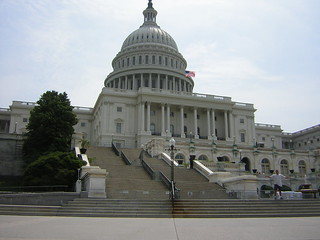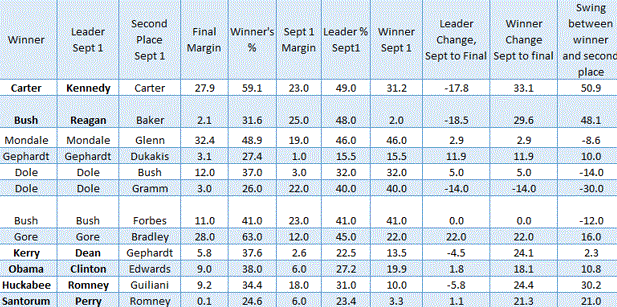Speaking in “his best precinct, the top-level donor conference call,” Mitt Romney announced this morning that he will not run for president a third time. Though the odds against a successful bid for the presidency would seem obvious to any casual politics watcher, Romney appears to have genuinely believed that he could win in 2016 with a sharper message. But many of his top donors, bundlers, and early-state volunteers were reluctant to board the Romney train one more time. In what may have been the last straw, yesterday news broke that David Kochel will soon move to Miami to work as “senior strategist” for former Florida Governor Jeb Bush’s new political action committee. Kochel was Romney’s top Iowa consultant during the 2008 and 2012 election cycles but is expected to become Bush’s national campaign manager once Jeb makes his presidential race official.
Kochel told Jonathan Martin of the New York Times that a lot of Iowans “will be interested in signing up” with Jeb Bush, adding that “You compete everywhere because that’s how you win delegates.” Some people had speculated that Bush might bypass the Iowa caucuses, seen to favor socially conservative candidates. He skipped Representative Steve King’s cattle call “Iowa Freedom Summit” last weekend in Des Moines, where several of the speakers took shots at him.
In general, Bush has spent the last month on major donor contacts and strategizing rather than public appearances. Bank on him to raise far more money than anyone else in the large presidential field during the first half of this year. He could raise as much as the rest of the field combined.
With Romney out, New Jersey Governor Chris Christie looks like the only person who can compete with Jeb for the “establishment Republican” niche. He reminded the audience at the Iowa Freedom Summit that he’s visited this state eleven times since 2010. You can listen to that speech at Radio Iowa.
Iowa Republican power-broker Bruce Rastetter spearheaded a “draft Christie” before the 2012 Iowa caucuses. So far this cycle, he is staking out a more neutral position. Last week Rastetter’s public relations team announced plans to hold an Iowa Agriculture Summit in Des Moines on March 7. About two dozen possible presidential candidates from both parties have been invited to participate; the full list is in a press release I’ve enclosed after the jump. Governor Terry Branstad told Radio Iowa this week that Jeb Bush is “very interested” in attending the forum.
While most of the speakers at King’s overly long Freedom Summit came to town solely for that occasion, 2012 Iowa caucuses winner Rick Santorum toured the state for several days afterward. He is still pushing a message I think Republicans should hear about how the GOP could better connect with working-class Americans. Radio Iowa posted the full audio here. According to Iowa Starting Line, Santorum didn’t draw a lot of applause at the Freedom Summit but was well-received at his small events this past week. Nevertheless, I expect most of his 2012 supporters to flow to other candidates this year, especially Mike Huckabee, Ben Carson, or Ted Cruz.
I still like Wisconsin Governor Scott Walker’s chances to win the Iowa caucuses. By all accounts he made a good impression on the Freedom Summit crowd. So did Ben Carson, but I don’t see Carson putting together a professional campaign operation. Radio Iowa posted the full audio and highlights from the Walker speech here. Click here to listen to Ted Cruz, another crowd favorite.
In contrast, former half-term Alaska Governor Sarah Palin bombed at the Freedom Summit, done in by a malfunctioning teleprompter. With her public speaking experience, she should have been able to wing it. I had to laugh when I saw Sam Clovis bash her to the Sioux City Journal’s reading audience. He’s probably still bitter that Palin endorsed Joni Ernst for Senate last spring when Clovis was campaigning as the true conservative in the GOP field.
The Republican Party of Iowa is accepting straw poll venue bids until Thursday, February 12. A recent press release said “Venue proposals should be able to accommodate large crowds and have ample parking.” The major fundraiser coming this August has traditionally been held in Ames, but I’m hearing there will be a strong push for Farm Progress Show in Boone. The State Fairgrounds in Des Moines are another leading contender for the event.
In news from the Democratic side, Mike Allen reported for Politico that former First Lady and Secretary of State Hillary Clinton “strongly considering delaying the formal launch of her presidential campaign until July.” A lot of Iowa Democrats are upset that Clinton has in effect frozen the field of play. They won’t be happy if she leaves everyone hanging until mid-summer. By this point in 2007, several Democratic presidential candidates already were opening field offices in key Iowa cities.
Former Maryland Governor Martin O’Malley made his first Iowa hire recently. Jake Oeth, who served as political director for Bruce Braley’s U.S. Senate campaign, is now doing outreach for O’Malley as a consultant to the O’Say Can You See PAC. According to Pat Rynard at Iowa Starting Line, O’Malley had been recruiting Oeth for some time. The former Maryland governor has Iowa connections going all the way back to Gary Hart’s 1984 presidential campaign and paid his dues last year with several Iowa visits, including the keynote speech for the state Democratic Party convention and fundraisers for Democratic candidates. Although some consider the former Maryland governor a possible rival to Clinton, I see him more as a back-up candidate if some unexpected development prevents Clinton from running.
MoveOn.org Political Action opened a Des Moines office for the Run Warren Run effort two weeks ago. I’ve posted the announcement after the jump; it mentions the first Iowa staff hires. As Bleeding Heartland discussed here, I think the “draft Warren” effort is mostly a waste of progressive energy and resources. Not that I’m against house parties for liberals, but they could be organizing around a more practical political cause. Spending hundreds of thousands of dollars to recruit Warren won’t change the fact that she is not running for president. Pat Rynard attended the Run Warren Run office kickoff party on January 29 and posted his thoughts on the campaign’s “murky mission.”
I haven’t heard much lately about U.S. Senator Jim Webb, who formed an exploratory committee late last year to consider a presidential bid. I never bought into him as a serious rival to Clinton, and he didn’t respond adeptly to the first real scrutiny of his PAC’s activities. I’m keeping an open mind about the Democratic race until the field is set, but if Webb turns out to be the only alternative candidate, I will be caucusing for Hillary.
Any comments about the Iowa caucuses are welcome in this thread.
Continue Reading...







